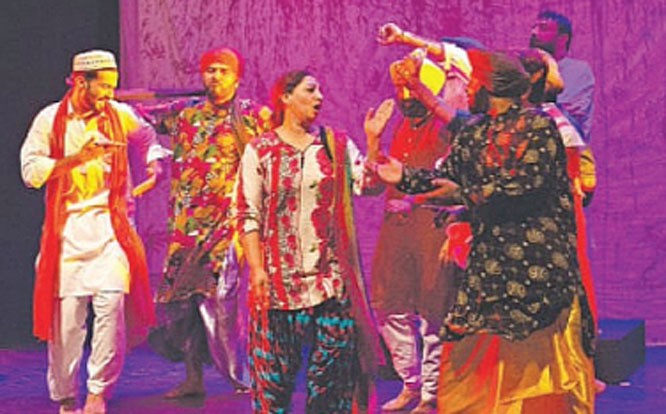
Alhamra Theatre Festival brings forward fresh interpretations of popular plays

At the Alhamra Theatre Festival held last week most of the plays staged had been mounted many a time previously.
The plays staged were these included Ajoka’s Jhalli Kitheyjaway, Mass Foundation’s Permasher Singh, Azad Theatre’s Prem Gali Ki Prem Kahani, Drama Baaz’s Dekh Tu Ne Kaya Kiya, Jaag Sudhar Society’s Nehle Pe Dehla and Aj Akhan Waris Shah Noo by Waris Shah Arts Society.
Except for Dekh Tu Ne Kaya Kiya all the plays have been done many a time. There is no harm in plays being staged over and over again. This consolidates the body or repertoire of stage plays that are there for the producers to dip into and wring out a production or a performance. In the past, the basic problem for theatre personnel was that there were no plays (or a body of plays large enough) to be referred back to, probably with the intention of pulling one out of the bag for production. The body of plays is vital for any society which boasts of a living tradition because it can also refer to a production, benefit from it in a number of ways and capitalise upon the thespian assets, so to say. This releases an enthusiast from the bind of starting from a scratch or peering into the void wondering which play to stage. It is the backdrop against which fresh dramaturgical activity can take place.
One reason why Europeans in particular -- and even the Americans -- have an advantage of sorts in theatre is that they have a body of plays to fall back upon. Ranging from the Greeks to the present time, the body has been growing. This has given them the advantage of hindsight, as well as of drawing upon past performances, various techniques and movements that have developed around productions and playwrights.
In the past there were few such productions here that one could fall back upon, for initially the body of plays was small and those plays were mainly adaptations and further adaptations with every repeat production with the result that the plays were left only with a very tenuous link with their origins. Even that could be viewed as a positive development because the massive indigenisation spoke up the ingenuity of the directors and producers in trimming a foreign script to local tastes and commercial requirements.
There thus had, and has, always been a problem with scripts. The scripts have hardly been original. Many in circulation have been heavily worked upon. So, it was quite understandable that the same scripts were being used for new production. It’s a little baffling, however, that the productions, too, were mostly the same. The scripts were expected to be re-imagined and fresh production put up for the audiences to be exposed to another interpretation on stage. The director is supposed to interpret the play anew. The real merit of a play or script is that it has embedded layers that can be tapped into and re-interpreted. But the productions were the same and it seemed that one was seeing the re-run as of a film.
This is where theatre has to be different from the films because on screen it is that same film and only a re-run is promised. If there has to be new or fresh insight, looking for it is the function or the responsibility of the viewer or the audience. A fresh reading of the film rests solely on the shoulders of the individual who has opted to spend his money on watching something that he has already seen. But it is not so with theatre because it is the director’s responsibility to discover the embedded nuances in the play. If there are none, there is no point in putting up the production for the repetition will fall flat and refuse to speak to anyone.
In the past decade or so many plays were written which could be called original, at least in their flavor and approach to the issues that have been troubling this nation, issues that have marred people’s lives; societal norms which have put down many in the name of tradition or religion. It appears that less new plays or scripts, whatever their quality, are being written. Else, the once enthusiastic playwrights are beginning to dry up, drained out or exhausted.
There is a need now for writing new plays as never before. This will send signals that a new crop of writers has arrived on the scene to take over the baton. Or else, there should be fresh, new people reinterpreting the scripts that have been in circulation for a long time.
One could see the mingling of seasoned professionals with the young. This is always a very positive sign in that it ensures continuity and a release from the false impression that everything is being done for the first time. Malik Aslam, Zaheer Taaj, Sarfaraz Ansari, Feroz Ejaz Butt, and the younger team now involved in Ajoka’s production led by Nirvan Nadeem point to a future of more experimental handling of the scripts already in the repertoire.
Alhamra should also not flag from its responsibility and keep offering its platform to non-professional outfits. The continuous and regular holding of similar festivals is the only way new talent and new approaches to theatre can keep coming.